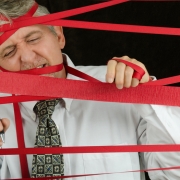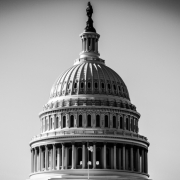Entrepreneurship Brings Innovation And Betterment For All. Government Regulation Throttles It.
Even in an age of hyper-partisanship, people still like a good underdog story and few are better than the small start-ups taking on the giants of industry. Entrepreneurialism helps create jobs, innovations, and other economic and social opportunities. It’s a story everyone can get behind.
Everybody, that is, except the incumbents and their political lackeys, who do not want pesky upstarts disturbing the status quo. Those companies and policymakers will take steps to protect their market and political turf—primarily through the creation and preservation of regulations. They usually sound well intentioned, but ultimately they only serve their interests at the expense of competitors, consumers, and the public.
This partially explains the decline in business dynamism in recent decades. “Business dynamism, is the process by which firms continually are born, fail, expand, and contract, as some jobs are created, others are destroyed, and others still are turned over,” explain Brookings scholars Ian Hathaway and Robert E. Litan. This dynamic process of entry, entrepreneurialism, and constant Schumpeterian “creative destruction” is essential to a well-functioning economy. Unfortunately, Hathaway and Litan, along with many other economists, have documented how this dynamic process has been slowed by various factors.
A new NBER working paper, “The Failure of Free Entry,” finds that “regulations and lobbying explain rather well the decline in the allocation of entry.” Economists Germán Gutiérrez and Thomas Philippon show that, “regulations have a negative impact on small firms, especially in industries with high lobbying expenditures.” Their results also document how regulations, “have a first order impact on incumbent profits and suggest that the regulatory capture may have increased in recent years.”
The problems of excessive lobbying (or “rent-seeking”) and “crony capitalism” are well-documented, especially by public choice scholars. But almost all economists and political scientists agree that competition and new entry are essential for expanding economic opportunity and enhancing consumer welfare. With openness comes dynamism.
Too often, however, regulatory systems are rigged to guarantee to opposite—stasis. “Time and again, the losing interest groups created by scientific progress or technological change have been able to convince politicians to block, slow, or alter government support for scientific and technological progress,” says Mark Zachary Taylor, author of The Politics of Innovation. “The losers and their political representatives have interfered with markets, public institutions and policies, and even the scientific debate itself—whatever they can do to protect their interests.”
When the status quo can be protected through political shenanigans, it creates perverse incentives for firms. As Tyler Cowen notes, “lobbying reorients the culture of a company toward politics and law, and away from innovation.” Instead of being market entrepreneurs, they become what scholars refer to as “political entrepreneurs” or “unproductive entrepreneurs.” Such entrepreneurs are not creating value for society; they are just expropriating it from others.
Economists George Stigler and Mancur Olson did pioneering work explaining how and why this occurs. Stigler identified how firms will “invest” in legislation or regulation as they did any other input. “The state—the machinery and the power of the state—is a potential resource or threat to every industry in the society,” Stigler wrote in 1971. “With its power to prohibit or compel, to take or give money, the state can and does selectively help or hurt a vast number of industries.”
Olson explained how special interests accomplished this in practice. “Lobbying increases the complexity of regulation and the scope of government,” he argued in his 1982 book, The Rise and Decline of Nations. It also gives rise to what Olson referred to as the problem of “complex understandings” of law and regulation.
“When regulations are established through lobbying or other measures, there is an incentive for ingenious lawyers and others to find ways of getting around the regulations or ways of profiting from them in unexpected ways,” he noted. “The more elaborate the regulation, the greater the need for specialists to deal with these regulations,” and, “[w]hen these specialists become significant enough, there is even the possibility that the specialists with a vested interest in the complex regulations will collude or lobby against simplification or elimination of the regulation.”
In his 2015 book, The Business of America is Lobbying, Lee Drutman confirmed Olson’s insight using hard data to show how lobbying has become “sticky” over time in the sense that “lobbying has its own internal momentum” and has become self-perpetuating. “As companies lobby more,” Drutman argues, “they have a greater capacity to tackle big issues, and they have more lobbyists encouraging corporate managers to think of public policy as a strategic advantage.” This is the essence of Olson’s problem of “complex understandings” in action.
These complex understandings result in mountains of regulatory restrictions. For example, Mercatus Center research documents how the Code of Federal Regulations contained over 1,080,000 total restrictions as of 2016 and that “regulation has grown steadily by about 13,000 restrictions per year.” As this sea of red tape swells, the “landscape that entrepreneurs have to navigate becomes ever more twisted and tortuous,” notes Stony Brook University finance professor Noah Smith. “The eventual outcome is a reduction in both dynamism and the forward march of technology.”
This has troubling implications for the innovative capacity of business as well as the overall competitiveness of the entire economy. These acts of political favoritism “not only misallocate resources in the short term but they also discourage dynamism and growth over the long term,” note Brink Lindsey and Steven Teles in their recent book, The Captured Economy: How the Powerful Enrich Themselves, Slow Down Growth, and Increase Inequality.
Indeed, as additional Mercatus Center research shows, “[e]conomic growth in the United States has, on average, been slowed by 0.8 percent per year since 1980 owing to the cumulative effects of regulation.” This means that “the U.S. economy would have been about 25 percent larger than it actually was as of 2012” if regulation had been held to roughly the same aggregate level as it stood at in 1980.
Moreover, another Mercatus study found that, “a 10 percent increase in regulatory restrictions on a particular industry is associated with a reduction in the total number of small firms within that industry by about 0.5 percent.” And a 2016 study by Boston University economist James Bessen also found that, since 2000, growing regulation and political activity accounted for a large share of the rise in valuations and profits among established corporations.
Excessive lobbying and rent-seeking also make efficient government impossible and lead to what Jonathan Rauch has labeled “demosclerosis,” or “government’s progressive loss of the ability to adapt.” “[A]s layer is dropped upon layer,” he notes, “the accumulated mass becomes gradually less rational and less flexible,” he argues.
So how do we address this problem? In a previous essay, I argued a periodic “spring cleaning for the regulatory state” was essential if we hope to address regulatory accumulation. For starters, we need to get the problem of over-licensing and over-permitting under control at the federal, state, and local level. While sometimes justified, licenses are a direct restriction on entry and entrepreneurialism and should only be employed for the riskiest activities and professions. “Permissionless innovation” should be the default.
Many other laws and regulations create direct or indirect barriers to the emergence of new ideas and organizations. “Sunsets” can help get that problem under control. Lawmakers should take the regulatory state off of autopilot and ensure that all laws and regulations are sunset on a regular timetable to keep rules fresh. This would also help get rid of the many regulations that have outlived their usefulness, or did not make sense to begin with.
To be sure, reform will be slow, but we need to start somewhere. As I noted before, some states are finally getting serious about cleaning house and are using sunsetting efforts and other regulatory reforms. If we all really care as much about new business start-ups and innovation as much as we all profess, then it is time to get serious about removing simple obstacles to a happier, healthier, and wealthier country.
Adam Thierer is Research Fellow at the American Institute for Economic Research






